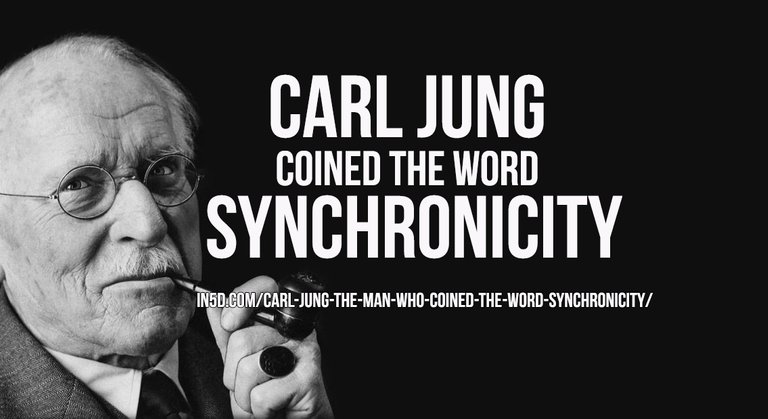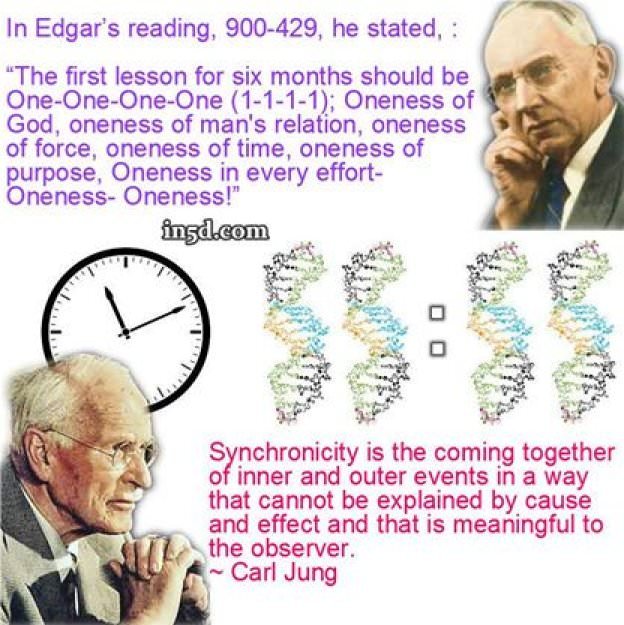Compiled by Gregg Prescott, M.S.
Editor, In5D.com
Have you ever experienced an 11:11 synchronicity? Psychologist Carl Jung coined the term synchronicity, which many of us use on a daily or weekly basis.
Synchronicity is the coming together of inner and outer events in a way that cannot be explained by cause and effect and that is meaningful to the observer.The definition of synchronicity was originally developed by Swiss psychologist Carl Gustav Jung. Jung co-defined the word to describe what he called "temporally coincident occurrences of acausal events." Jung variously described synchronicity as an "'acausal connecting principle'" (i.e., a pattern of connection that cannot be explained by conventional, efficient causality), "meaningful coincidence" and "acausal parallelism". Jung introduced the concept as early as the 1920s but only gave a full statement of it in 1951 in an Eranos lecture, then in 1952 published a paper "Synchronicity — An Acausal Connecting Principle" in a volume with a related study by the physicist (and Nobel winner) Wolfgang Pauli.
It was a principle that Jung felt gave conclusive evidence for his concepts of archetypes and the collective unconscious, in that it was descriptive of a governing dynamic that underlay the whole of human experience and history — social, emotional, psychological, and spiritual. Events that happen which appear at first to be coincidence, but are later found to be causally related are termed as "incoincident".
Jung believed that many experiences perceived as coincidence were not merely due to chance but, instead, suggested the manifestation of parallel events or circumstances reflecting this governing dynamic.
One of Jung's favorite quotes on synchronicity was from Through the Looking-Glass by Lewis Carroll, in which the White Queen says to Alice: "It's a poor sort of memory that only works backwards".
According to Occam's razor, positing an underlying mechanism for meaningfully interpreted correlations is an unsupported explanation for a "meaningful coincidence" if the correlations may alternatively be explained by simple coincidence. The amount of meaningful coincidence which one expects by random chance is higher than most people's intuition would lead them to believe, an observation known as Littlewood's Law. Jung and followers believe that synchronous events such as simultaneous discovery happen far more often than random chance would allow, even after accounting for the sampling bias inherent in the fact that meaningful coincidences are noticeable while meaningless coincidences are not.
In psychology and cognitive science, confirmation bias is the tendency to search for or interpret new information in a way that confirms one's preconceptions and avoids information and interpretations which contradict prior beliefs. Many critics believe that any evidence for synchronicity is due to confirmation bias, and nothing else.
Wolfgang Pauli, a scientist who in his professional life was severely critical of confirmation bias, lent his scientific credibility to support the theory, coauthoring a paper with Jung on the subject. Some of the evidence that Pauli cited was that ideas which occurred in his dreams would have synchronous analogs in later correspondence with distant collaborators
Jung claims that in 1805, the French writer Émile Deschamps was treated to some plum pudding by a stranger named Monsieur de Forgebeau. Ten years later, the writer encountered plum pudding on the menu of a Paris restaurant, and wanted to order some, but the waiter told him the last dish had already been served to another customer, who turned out to be de Forgebeau. Many years later, in 1832, Émile Deschamps was at a diner, and was once again offered plum pudding. He recalled the earlier incident and told his friends that only de Forgebeau was missing to make the setting complete — and in the same instant, the now senile de Forgebeau entered the room.
In fact, Deschamps gives the name as "de Fontgibu", and also describes him as a Marquis and Colonel who fought against Napoleon under Louis Joseph de Bourbon, prince de Condé - "Oeuvres complètes de Émile Deschamps, 1873" and "Echoes from the Harp of France" a collection of works by G.S. Trebutien - since no de Fontgibu appears in French history, this is most likely an invented name and could easily be a purely fictional character.
So, whenever we have an 11:11 moment, we can all thank Carl Jung for officially coining the word, "synchronicity"!
P.S. Like many others here on FB, it appears that I’m shadow banned, so the only way you’ll get more info like this is to physically visit in5d.com. Please try to support ALL websites within this genre that resonate with you because our words are being silenced by those with the agenda that does not involve free speech.
Sending you all infinite love & light,
Gregg
Follow In5D and Gregg Prescott on MeWe, Informed Planet, Steemit, Minds, Gab, Twitter, Facebook
Click here for more articles by Gregg Prescott!
About the Author: Gregg Prescott, M.S. is the founder and editor of In5D and BodyMindSoulSpirit. You can find his In5D Radio shows on the In5D Youtube channel. He is a visionary, author, a transformational speaker, and promotes spiritual, metaphysical and esoteric conferences in the United States through In5dEvents. Please like and follow on MeWe, Informed Planet, Steemit, Minds, Gab, Twitter, and Facebook!


I know this is your original work. I have followed your blog for years. For some reason, the "cheetah" thinks you're cheating. Maybe because you're copying and pasting from your own site? In case you didn't know I just wanted you to rectify this with Steemit so you don't lose any of your well-deserved earnings.
Thank you!
Hi! I am a robot. I just upvoted you! I found similar content that readers might be interested in:
http://in5d.com/carl-jung-the-man-who-coined-the-word-synchronicity/